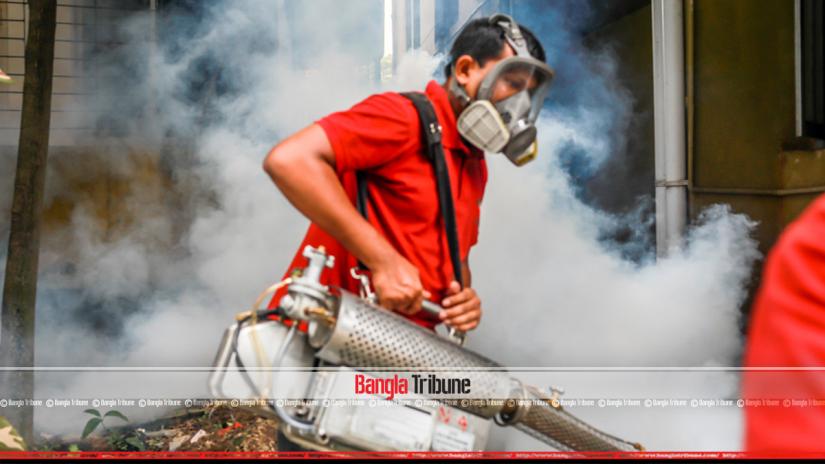 Dengue could not be controlled this year. First noted in 2000, in the first 18 years, the total number of affected was 50,076 but in 2019 alone, the number of patients reached 101,334 persons.
Dengue could not be controlled this year. First noted in 2000, in the first 18 years, the total number of affected was 50,076 but in 2019 alone, the number of patients reached 101,334 persons.
There isn’t any account in the history of the country for such a large number of people admitted to the hospital for one disease only.
Specialists believe that all efforts to eradicate mosquitoes failed in 2019.
Dengue is an endemic disease and will be prevalent all the year round, they feel.
The reasons for this are: climate change, temperature of Bangladesh, ineffective repellent, lack of monitoring of areas where mosquitoes breed etc.
At the same time, it was assumed that Dengue was a city based health emergency and therefore the focus was on the major cities, leaving out the suburbs. But last year, Dengue spread to the districts and at one point, the number of affected in the districts was higher.
Specialists say that equal importance has to be given to the termination of Aedes and Albopictus mosquitoes.
Last year, the Dengue situation exacerbated when mayor of Dhaka South City Corporation (DSCC) Sayeed Khokon refused to admit that Dengue was turning into an epidemic. He was later criticized for downplaying the enormity of the crime.
On Jul 12, Supreme Court lawyer, Tanjim Al Islam, sent a legal notice to DSCC mayor asking for Tk 5 million as compensation when his wife was affected by Dengue. After the mayor visited his house, he was forced to concede that the Dengue was worse than previous years.
At this time, he assured the residents, saying that the DSCC will be by the side of the residents.
“We have begun using new repellent leaving out the old one,” he told the media and the people.
Former DSCC mayor Sayeed Khokon, fined owners of buildings where Aedes mosquitoes were found whereas mayor for Dhaka north, DNCC, Atiqul Islam, formed committees in his area and also went around with teams to destroy mosquito larvae.
However, in the end, the drives did not produce the expected result since the city did not have effective repellent.
In 2019, the Dengue situation became diabolical with people from all layers of society suffering.
Many expatriates who came to the country also faced Dengue while some died. The hospitals in the city, both government and private, were overwhelmed with patients.
At the beginning of the Dengue epidemic, Health Minister Zahid Malik, was criticized for going overseas, ignoring the emergency. But he came back quickly and cancelled all leaves of government doctors and nurses and formed emergency cells.
At the end of 2019, the number of patients suffering from Dengue fell and in the last 24 hours, five persons were admitted to the hospital with Dengue.
Speaking on why Dengue suddenly took the form of an epidemic, former director of Institute of Epidemiology, Disease Control and Research (IEDCR) Dr Mahmudur Rahman, said: “The rise happened over time; Dengue evolved and took a complicated form.”
Former dean of BSMMU, Dr ABM Abdullah, said: “Mosquitoes could not be killed and, as a result, Dengue spread.”
Researcher for ICDDRB Atriq Hassan, said: “Mosquitoes need to be eradicated and national plus international bodies must work together to tackle this.”
Professor of the health department Dr Tania Tahmina feels that a strategic plan needs to be chalked out to face Degnue, otherwise, this will take a worse turn next year.
 Others
Others
41318 hour(s) 3 minute(s) ago ;
Morning 08:57 ; Friday ; Jul 04, 2025
Mosquito killing drives proved unavailing
Send
Jakia Ahmed
Published : 04:00, Jan 02, 2020 | Updated : 04:00, Jan 02, 2020
Published : 04:00, Jan 02, 2020 | Updated : 04:00, Jan 02, 2020
0 ...0 ...
/tf/
Topics: Top StoriesExclusive
- KOICA donates medical supplies to BSMMU
- 5 more flights to take back British nationals to London
- Covid19: Rajarbagh, Mohammadpur worst affected
- Momen joins UN solidarity song over COVID-19 combat
- Covid-19: OIC to hold special meeting
- WFP begins food distribution in Cox’s Bazar
- WFP begins food distribution in Cox’s Bazar
- 290 return home to Australia
- Third charter flight for US citizens to return home
- Dhaka proposes to postpone D8 Summit
Unauthorized use of news, image, information, etc published by Bangla Tribune is punishable by copyright law. Appropriate legal steps will be taken by the management against any person or body that infringes those laws.
Bangla Tribune is one of the most revered online newspapers in Bangladesh, due to its reputation of neutral coverage and incisive analysis.
F R Tower, 8/C Panthapath, Shukrabad, Dhaka-1207 | Phone: 58151324; 58151326, Fax: 58151329 | Mob: 01730794527, 01730794528


